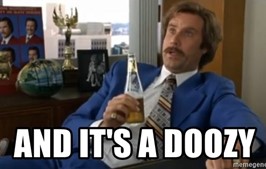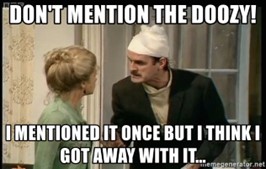Did your friend buy an unreliable second-hand car? You could call it a ‘doozy.’ This post unpacks the meaning and origin of this expression.
Meaning
The expression ‘doozy’ describes a person, place, product, or action that’s unique. It can refer to something that adds value to a situation or a mistake. Typically, it has a positive connotation, but it’s common for people to use it in a negative light when referring to an error.
‘Doozy’ can refer to an outstanding formation or result or to a big mistake, depending on the context of the conversation. A ‘doozy’ on your hands could refer to something you want to happen or something you wish never happened.
Example Usage
"That's a doozy. I can't believe it ended up like this, we had such high hopes for it, and now it's nothing but a letdown. Oh well, back to the drawing board."
"Yeah, it was a real doozy, for sure. I don't know what we can do about it. There's no way we can exchange it for something else."
"That plan turned out to be a real doozy. That's the last time I take advice from you. Next time, I'll just go with my intuition instead of trusting other people."
"That event was a real doozy, for sure. I had no idea the speakers would be that bad. It was like listening to a high school science presentation. So boring."
"My new Tesla turned out to be a doozy. The back bumper fell off when I was doing 80 on the freeway last week. I nearly killed someone."
"The latest album from DaBaby is straight trash. It's a real doozy, and he would have done better not releasing anything at all."
"Look, it's a doozy, and there's nothing we can do about it. We'll have to learn from the experience and move on with our lives."
"This car is a real doozy. I spent all my savings on it, and it's costing me an arm and a leg in repair bills."
"That was a real doozy of a mistake. You should have thought it through before acting irrationally like that. Don't make the same mistake again."
"We have a real doozy on our hands here. I can't decide if it's a good or a bad thing. What do you think?"


Origin
The expression ‘doozy’ originates from the 1920s. Fred and August Duesenburg were the founders of an automotive manufacturing brand, producing cars known as ‘Duesies.’ Unfortunately, the cars weren’t reliable, frequently encountering mechanical problems that left the owner stranded on the road.
The earliest use of the phrase is in 1836, when it appears in ‘The Clockmaker,’ describing a perfect doll as a ‘daisy.’ Italian actress, Eleonora Duse, coined the term in 1893, changing it to ‘Doozy’ in the early 1900s.
Phrases Similar to Doozy
- Bust.
- Dud.
- Flop.
- Lemon.
- Letdown.
Phrases Opposite to Doozy
- Extraordinary.
- One of its kind.
What is the Correct Saying?
- Doozy
Ways People May Say Doozy Incorrectly
The term ‘doozy’ has nothing to do with dozing off to sleep. It’s also common for people to use it in the wrong context. A doozy has nothing to do with your actions. It refers to a place, person, object, or task.
Acceptable Ways to Phrase Doozy
You can use the term 'doozy' to describe a good or bad result. The idiom has a positive or negative connotation, depending on the context of the conversations. It has positive or negative connotations, depending on the context of the conversation. It's a colloquial term, but it's suitable for professional and social conversations.
For instance, you could use it to describe making a mistake at work, or you could use it to describe something pleasant happening to you at home. Typically, people use it to describe something in a negative light. It's a versatile phrase and refers to actions, reactions, people, and items. The term suits text-based conversations and verbal exchanges.